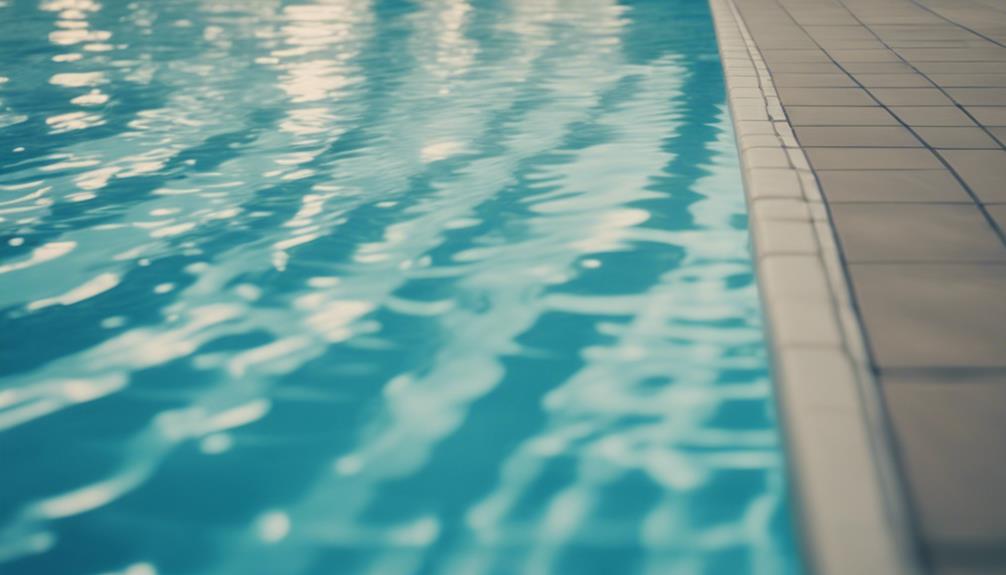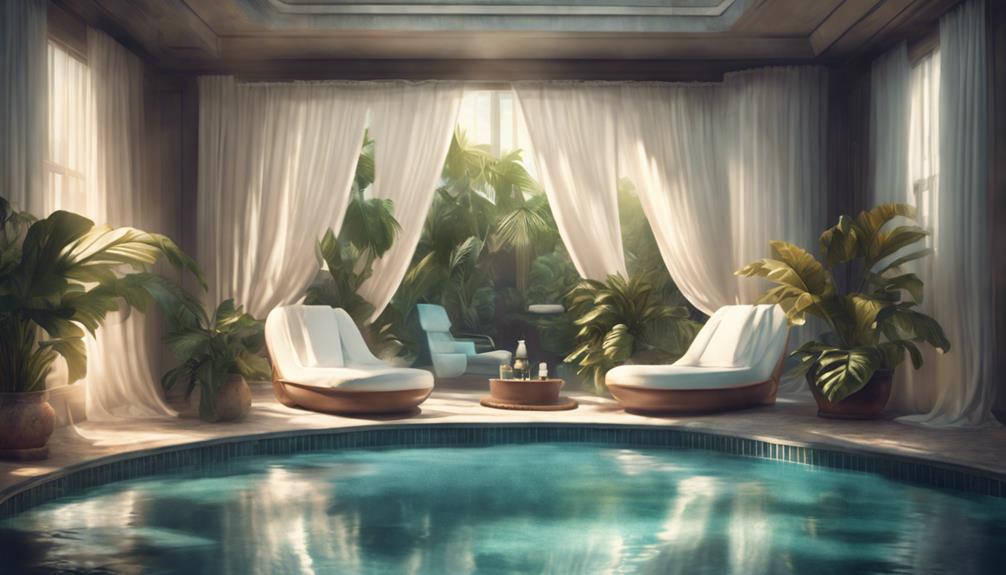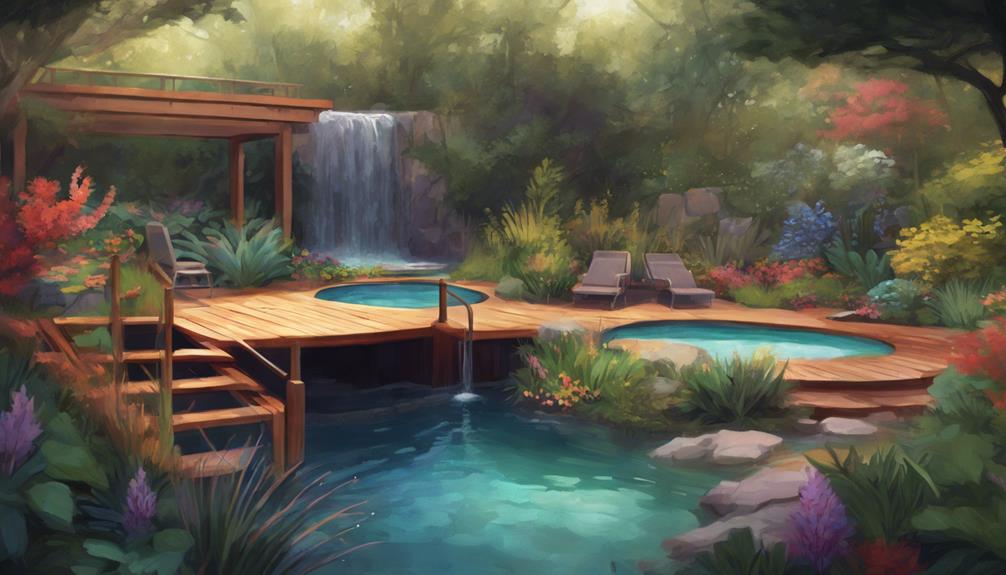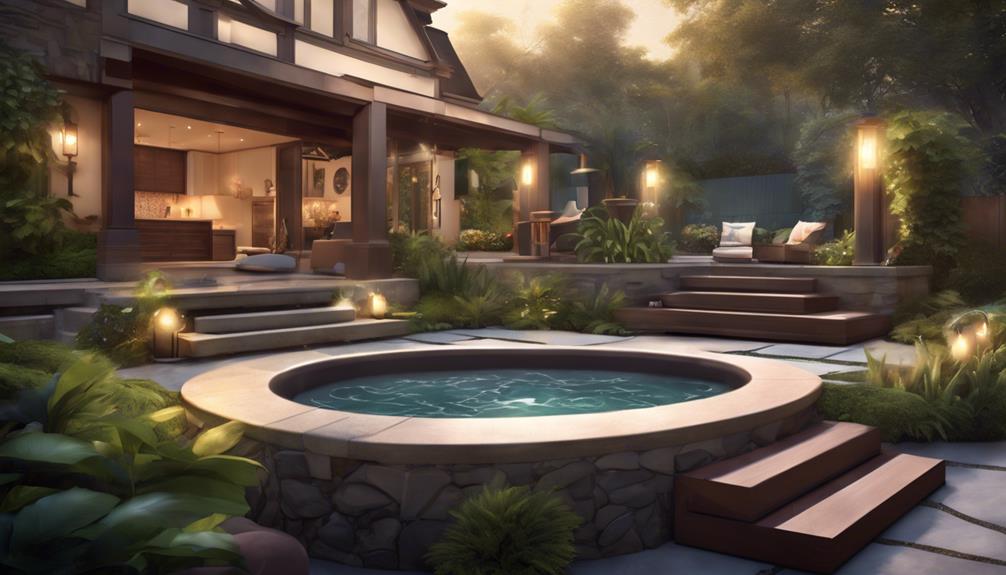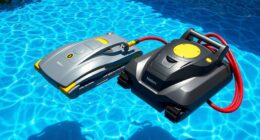Ever thought about why swimming pools are typically so deep? Well, deep pools act as a large safety buffer for divers! They ensure that when you jump in or attempt some fancy diving tricks, you won’t hit your head on the bottom! Additionally, deep pools are ideal for exciting diving activities like high dives, impressive maneuvers, and plenty of practice opportunities! There’s more to deep pools than just safety, though; they also serve well for underwater filming and enhancing your aquatic adventures. Curious? Continue exploring to unveil the mysteries behind those deep, blue pools!
Key Takeaways
- Ensure safety for divers during various diving techniques.
- Accommodate high dives, maneuvers, and diver training effectively.
- Facilitate high-quality underwater filming for filmmakers and researchers.
- Create realistic diving conditions to build confidence and skills.
- Enhance scuba training environments by offering realistic settings for practice.
Safety for Divers
Ever wondered why swimming pools need to be deep?
Well, deep swimming pools are essential for ensuring the safety of divers practicing various diving techniques. When you're diving, having enough depth is vital to make sure you don't bump into the pool floor and get hurt. Imagine trying to do a fancy dive but running out of space halfway through – not fun! That's why deep pools are perfect for professional divers who need room to perform high dives and cool maneuvers without any worries.
Safety is a big deal in diving, which is why there are regulations that specify the minimum depth required for diving activities. These rules are there to keep divers safe and sound while they show off their skills. Whether it's training, competitions, or exhibitions, having a deep swimming pool is a must to help divers practice effectively and master their craft.
Accommodate Diving Activities
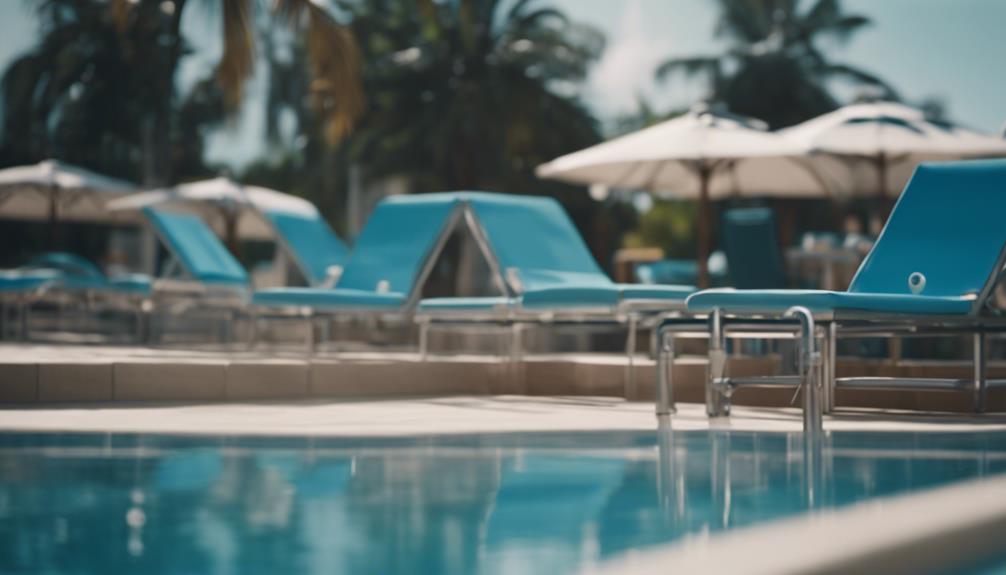
Hey there, ever wonder why swimming pools need to be deep?
Well, it's all about making sure divers stay safe while doing their cool flips and twists.
These deep pools give divers enough space to show off their skills without worrying about bonking their heads on the bottom.
Diving Safety Regulations
To guarantee safe diving activities, diving safety regulations stipulate that swimming pools must provide adequate depth to prevent divers from hitting the bottom. Deep pools are a necessity for accommodating diving activities safely. These pools adhere to specific minimum depth standards to make certain divers have enough water depth to dive without risks.
Imagine diving into a shallow pool – ouch! That's why deep pools are vital for diving safety. By meeting these regulations, pools minimize the chances of injuries during diving. Picture yourself diving gracefully into a pool that's just the right depth – that's the goal of these regulations.
They're like the unsung heroes, silently working to keep divers safe without us even realizing it. So next time you take a dive, remember to thank the deep pool for having your back – or rather, your bottom!
Depth for Divers
Deep swimming pools provide the necessary depth for divers to safely perform various diving activities. You know those diving boards that make you feel like you're about to touch the sky? Well, they're usually placed at the deep ends of swimming pools for a reason. The deep ends give divers the space they need to execute their dives without worrying about hitting the bottom.
Olympic swimming pools, for example, have specific depth requirements to meet international diving standards. Divers need that depth to guarantee a smooth entry into the water and to avoid any unexpected bumps along the way.
When divers twist, somersault, or gracefully enter the water like synchronized swans, they rely on the depth of the pool to make sure everything goes swimmingly (pun intended). So, the next time you watch a diving competition, remember that those deep pools aren't just for show; they're essential for creating a safe and controlled environment for these impressive athletes to showcase their skills.
Enhance Scuba Training Environment
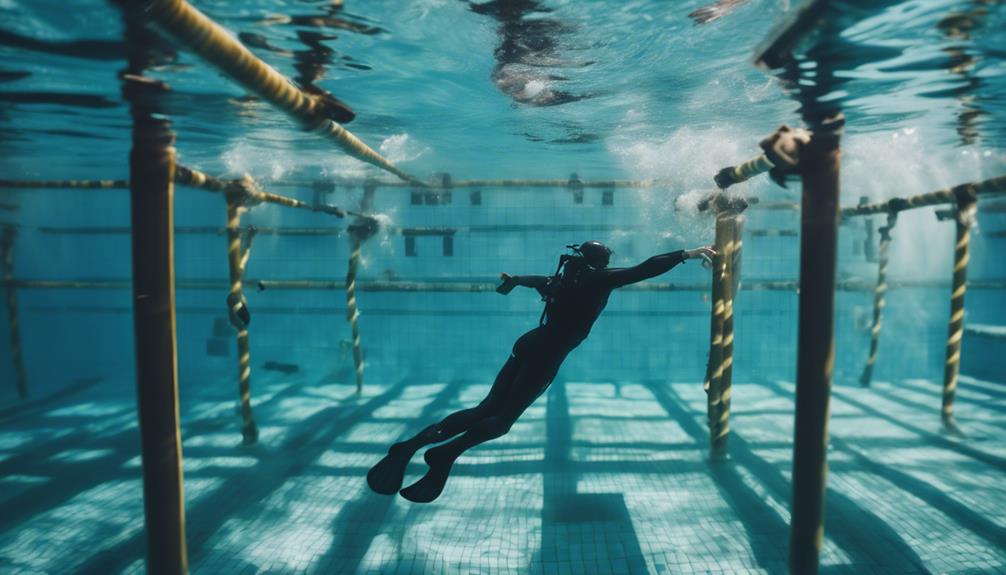
Enhancing the scuba training environment is facilitated by the depth of swimming pools, providing an ideal setting for divers to hone their skills and techniques.
Deep pools are like underwater classrooms where you can practice all sorts of cool scuba stuff!
In these deep waters, you can pretend you're diving way down deep, adjusting your buoyancy and mastering emergency procedures without worrying about bumping your head on the pool bottom.
The best part is, these deep pools let you experience how pressure changes as you go deeper, just like in the real ocean. It's like having your own little underwater science lab!
Plus, scuba instructors love deep pools because they can keep a close eye on you while you perfect your diving skills.
Facilitate Underwater Filming
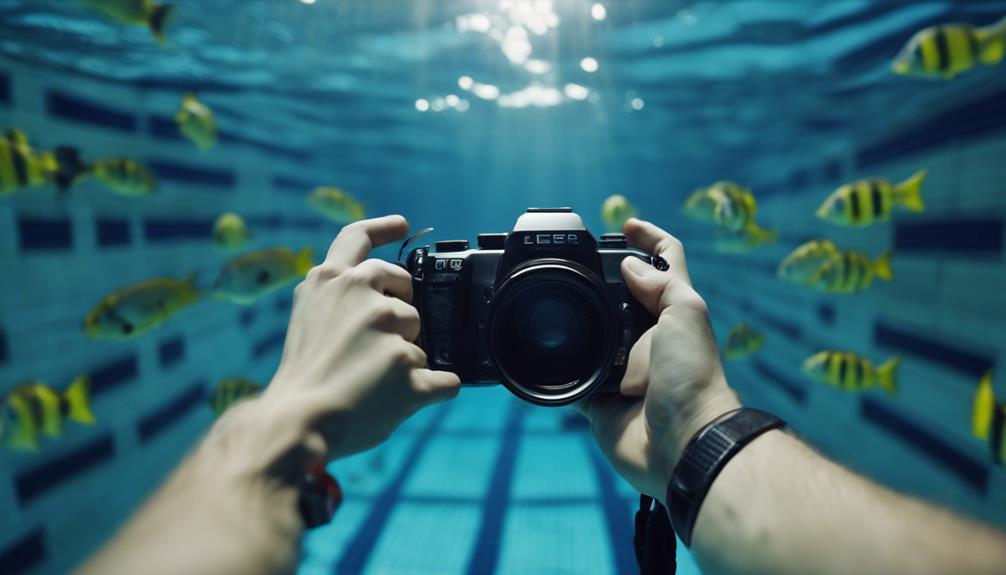
For filmmakers and researchers, the depth of swimming pools serves as a valuable asset in facilitating high-quality underwater filming. Deep pools create a controlled environment that's perfect for capturing stunning underwater scenes. The depth allows divers and equipment to move around freely, without any pesky constraints getting in the way.
Plus, the improved visibility and lighting conditions in deep pools make every shot look exceptional.
Imagine trying to film underwater in a shallow pool—it would be like trying to capture a blockbuster movie on your phone. Deep pools provide a safe and controlled setting for filming aquatic activities and marine life interactions.
With all that depth, filmmakers can use specialized equipment and techniques to create breathtaking underwater footage that rivals even the most epic ocean documentaries.
Create Realistic Diving Conditions

To replicate realistic diving conditions, swimming pools are engineered to provide a vital and essential environment for divers to hone their skills effectively.
Profound swimming pools play an important role in helping divers prepare for extensive dives without the uncertainties of open water. Imagine diving into the depths of a pool, simulating the challenges of deep-sea exploration while staying securely in a controlled setting.
These profound pools allow divers to push their limits, build confidence, refine techniques, and adapt to the demands of deep-water diving.
Increase Swimmer Challenge

Deep swimming pools offer swimmers a heightened level of challenge to elevate their skills and abilities in the water. When you plunge into those deep ends, you're not just testing your courage but also your strength and endurance. Moving through the deeper waters requires more effort and skill, pushing you to become a better swimmer.
It's like a fun obstacle course where the challenge isn't just about the distance but also about mastering advanced techniques. In these deep pools, you can practice submerging like a pro, swim underwater for longer stretches, and perfect those intricate strokes. It's the perfect place for competitive swimmers looking to step up their game and for those who want a more engaging workout.
Provide Varied Water Pressure
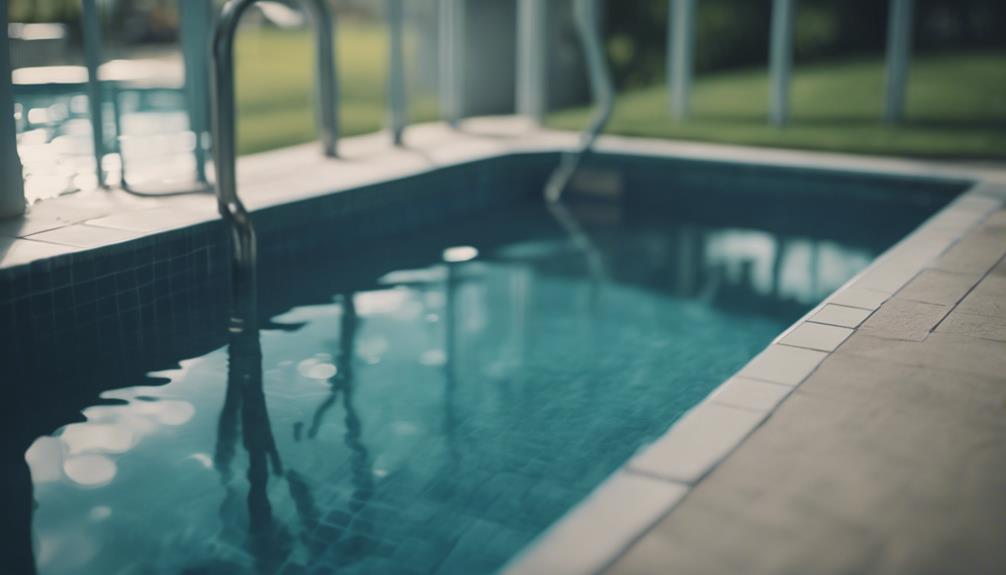
Ever wonder why swimming pools are so deep?
Well, deep pools offer more than just space for swimming. The varied water pressure in deep pools provides a unique workout experience, challenging your strength and endurance in a whole new way.
Plus, the depth also guarantees a safe environment for divers to do their thing without any worries.
Cool, right?
Water Pressure Dynamics
With varied water pressure, deep pools offer swimmers a unique and challenging environment to enhance their strength and endurance levels. The water pressure dynamics in deep pools create an atmosphere where you immerse yourself, making your workout more intense. Here's why water pressure dynamics in deep pools matter:
- Enhanced Resistance: The varied water pressure in deep pools provides resistance that challenges your muscles, helping you build strength and endurance.
- Simulated Natural Conditions: Deep pools mimic the ocean's changing water pressure, giving you a taste of swimming in a more natural environment.
- Improved Cardiovascular Fitness: Dealing with increased resistance due to water pressure encourages your heart and lungs to work harder, boosting your cardiovascular fitness.
- Dynamic Workout Environment: The depth of the pool affects water pressure, ensuring you have a dynamic and engaging swimming experience every time you submerge.
Depth for Safety
For a safer and more effective swimming experience, ensuring varied water pressure through pool depth is essential. Having a mix of shallow and deep ends in a pool not only adds fun but also enhances safety. Let's immerse ourselves into why depth matters for your well-being in the pool. Check out the table below for a quick overview of how varied water depths contribute to a safer swimming environment:
| Point | Importance |
|---|---|
| Safety | Prevents diving accidents |
| Shallow end | Ideal for beginners |
| Varied depths | Accommodates all swimmers |
| Maximum depth | Allows for advanced training |
| Water pressure control | Enhances stroke technique |
Elevate Aquatic Experience

To enhance your aquatic experience, deep swimming pools offer a thrilling environment for diving activities. Imagine diving into the depths, feeling the rush of the water as you plunge into the cool embrace of the pool. Here's why deep pools can take your swimming adventures to the next level:
- Safe Diving Practices: The depth of these pools guarantees that divers have ample space to dive safely without the risk of hitting the bottom.
- Enhanced Thrill: Deeper waters add an element of excitement and challenge, making your diving experiences more exhilarating.
- Training Opportunities: Deep pools provide a unique setting for honing your diving skills, perfect for both beginners and seasoned divers.
- Competition and Recreation: Whether you're training for a competition or simply enjoying a casual dive, deep pools cater to a wide range of aquatic activities.
Frequently Asked Questions
Why Are Swimming Pools so Deep?
So, you might wonder why swimming pools are super deep, right? Well, the reason is that deep pools are essential for safety and fair competition. They protect swimmers from waves, improve performance by reducing drag, and create a safer environment overall.
Plus, a deeper pool helps with temperature control, chlorine upkeep, and even gives spectators a better view. So, deep pools aren't just for fun; they're vital for an exceptional swimming experience!
Why a Pool Is Deeper Than It Looks?
Ever wonder why a pool is deeper than it looks? Well, buddy, it's all about how light plays tricks on your eyes underwater. The density of water bends light, making the pool seem shallower.
Plus, those sneaky reflections and lack of depth cues don't help either. So, next time you're taking a dip, remember, looks can be deceiving when it comes to pool depths!
Why Are Above Ground Pools Not Deep?
Well, above ground pools aren't deep mainly because they're like the fun-sized candy bars of the pool world. They're shallow for a few reasons: it's easier to install, keep an eye on, and hop in and out. Plus, they're more about chilling and splashing around than serious swimming.
Safety also plays a role in keeping them shallow. So, next time you're in one, remember, it's all about keeping it light and easy!
Is a Deeper Pool Better?
So, when it comes to swimming pools, having a deeper one does have its perks. A deeper pool is pretty awesome for competitive swimming because it helps reduce all that pesky drag from waves, making for faster laps and saving you some energy.
Plus, it's essential for safety and keeping things fair during competitions. So yeah, a deeper pool definitely has its benefits for swimmers looking to up their game!
What is the average depth of a standard swimming pool?
The average depth of a standard swimming pool is around 4 feet to 8 feet. However, deep swimming pool challenges are becoming increasingly popular, prompting builders to design pools with varying depths to cater to different skill levels and activities.
What Are the Benefits or Purposes of Having a Deep Swimming Pool?
Having a deep swimming pool challenges swimmers to improve their diving and swimming skills. It provides a safe environment for performing high dives and practicing underwater techniques. The depth also allows for greater flexibility in designing pool activities, such as water polo or synchronized swimming. Additionally, a deep pool can accommodate more people for aquatic sports and events.
What is the Standard Depth of a Swimming Pool?
The standard depth of a swimming pool can vary, but typically ranges from 3 to 5 feet for the shallow end and 5 to 8 feet for the deep end. Deep swimming pools challenges can include safety concerns, maintenance, and the need for proper supervision, particularly for inexperienced swimmers.
What is the Standard Depth of a Swimming Pool and Why?
The standard depth of a swimming pool is typically 8 feet. This depth allows for safe diving and swimming while also providing enough space for activities like water aerobics and water polo. However, deep swimming pool challenges can include increased maintenance and safety concerns for young or inexperienced swimmers.
Conclusion
So, next time you take a dip in a deep swimming pool, remember that there's more to it than just the thrill of jumping in!
Did you know that the deepest swimming pool in the world is called Y-40 Deep Joy in Italy? It goes down a whopping 42 meters (138 feet) deep, so imagine diving all the way down there!
Swimming pools may be deep for various reasons, but they definitely add an extra element of excitement to your aquatic adventures.
Happy swimming!

